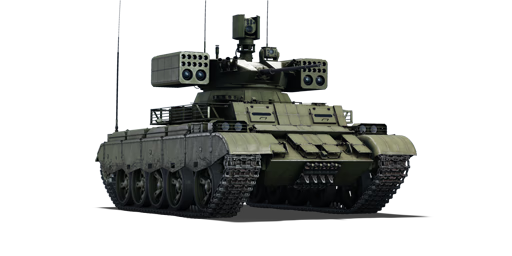

The QN506, officially nicknamed the "New King of Land Warfare" (新陆战之王) at the 2018 Zhuhai Airshow, is a defence vehicle based on the ZTZ59 chassis, equipped with a new 30 mm turret system, missile systems, and advanced TVD cameras for the crew. Marketed as a competitor to the Russian BMPT and designed for urban combat and counter-guerrilla operations, the vehicle has not yet received orders from international customers.
Introduced during Update "Sky Guardians" as one of the main rewards for the "Repair Factory" event, the QN506 was the first ground vehicle to introduce fire-and-forget missiles to ground battles. While its protection and mobility are largely similar to the ZTZ59, from which its chassis is derived, the QN506’s 24 guided munitions and 30 mm cannon can certainly make for a very difficult day for both aerial and ground targets.
| Ammunition | Type | Armor penetration (mm) at a distance: | |||||
|---|---|---|---|---|---|---|---|
| 10 m | 100 m | 500 m | 1000 m | 1500 m | 2000 m | ||
| ATGM (tandem) | 900 | 900 | 900 | 900 | 900 | 900 | |
| Ammunition | Type | Armor penetration (mm) at a distance: | |||||
|---|---|---|---|---|---|---|---|
| 10 m | 100 m | 500 m | 1000 m | 1500 m | 2000 m | ||
| ATGM | 200 | 200 | 200 | 200 | 200 | 200 | |
| Belt | Belt filling | Armor penetration (mm) at a distance: | |||||
|---|---|---|---|---|---|---|---|
| 10 m | 100 m | 500 m | 1000 m | 1500 m | 2000 m | ||
| APDS/HEF-I/APDS/HEF-I | 85 | 84 | 81 | 77 | 74 | 70 | |
| HEF-I/APDS/HEF-I/HEF-I | 85 | 84 | 81 | 77 | 74 | 70 | |
| APDS/APDS/APDS/APDS | 85 | 84 | 81 | 77 | 74 | 70 | |
| APFSDS/APFSDS/APFSDS | 102 | 101 | 94 | 85 | 76 | 67 | |
| Belt | Belt filling | Armor penetration (mm) at a distance: | |||||
|---|---|---|---|---|---|---|---|
| 10 m | 100 m | 500 m | 1000 m | 1500 m | 2000 m | ||
| AP-I/API-T | 13 | 12 | 7 | 3 | 2 | 0 | |












Mobility | |
|---|---|
Protection |
|---|
Firepower | |||
|---|---|---|---|
